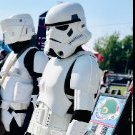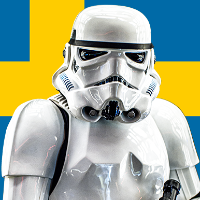-
Posts
315 -
Joined
-
Last visited
-
Days Won
3
About BigJasoni

Profile Information
-
Gender
Male
-
Location
Stafford, VA
-
Interests
Family!
Star Wars, running, cycling, outdoor sports, things and stuff.
FISD Info
-
3D Contributor Award
1
Standard Info
-
Name
Jason
-
501st ID
51923
-
501st Unit
Garrison Tyranus Inferno Squad
Recent Profile Visitors
3,574 profile views
-
daniellaashley started following BigJasoni
-
The best way to achieve the consistent stitch length is to use the industrial straight stitch machine, but the double, or every a triple needle, makes things go so much faster. The only thing you need to ensure is that there’s proper spacing between the needles which should be approximately 6mm. I have seen dual needle setups for industrials, but they’re typically off-brand contraptions that require several parts. However, there are actual multi needle machines available, but they start at around $2700, and unless you own a business that needs one, that’s probably not a worthwhile investment for the average hobbyist. Plus… I could buy a couple more sets of armor for that price. If you want to make your own ribbed fabric, go for it. The recommendation is to use a matte lame’ fabric backed with headliner material. I might post a picture of some here later, or maybe even a tutorial/ build thread. Good luck
-
Yes. The conversation started because I ordered soft parts for my Deathtrooper, but didn’t want the kidney seal because I ordered a rubber one. When I realized the rubber seals won’t pass Specialist review in the Spec Ops Detachment, I reached back out to Dave and he talked me through the construction. However, he did this knowing that I have an industrial sewing machine. You can do ribbed stitching using a home machine, but it either takes a steady hand, or an advanced machine. On the plus side, with a home machine, you can use a double needle and that’s a huge asset. I can walk you through the process, but if you want to talk to someone who’s done some awesome work using a home machine, reach out to @Cricket. Her Shoretrooper shirt was phenomenal and definitely worth checking out.
-
Did I refer her to you? I can’t remember, but I bought a Shoretrooper seal from her a couple years ago and it’s great. I try to send people that way as much as possible. Nice selection.
-
Lol. Yeah, sorry about this guys. I’ve been extremely busy with work for a while. It’s probably time to get cracking on this again.
-
Personally I feel that the Keep Trooping body suit is as good as it gets. I’ve been trooping in mine all year and the ribs are individually stitched. The Darkside Closet shirt I posted isn’t individually stitched. You can reach out to Mike to see if he is doing them differently now, but he has a long wait list. The other option is Sheev’s Emporium. I haven’t seen Dave list a Stormtrooper specific shirt, but he does a phenomenal job with the stitch work and would probably work with you on it. He also taught me how to do this stitching, but I haven’t made a shirt using the technique yet. I hope this helps.
-
James, I didn’t see this a couple days ago because I was torturing myself in another ultramarathon, but you know I’m always more than happy to help. First, I’m glad to see you took the CF Filament advice. Again, yes it is a PLA compound, but the 20% Carbon Fiber changes the entire dynamic and structure. Everything I’ve ever had an issue with regarding PLA is erased with this stuff and I’ve stress tested it excessively including in all that heat we had this year. Also, here’s a little secret for everyone as to why I’m a fan… The office I used to work for was sending components made from this stuff out to Iraq and Afghanistan, so I’ve got full confidence in its ability to handle a few 501st troops. So, starting with the helmet, sand it down moving from 80-220 grit first. You’ll see it start to smooth out after a round of 110 grit, but if you really want to cut your finishing time, get some fingernail files/ emery boards and just go to town. https://a.co/d/54Oe92A The filament will take on a gray, almost cloudy color, then you’ll be ready for filler primer. Here’s a 000 head I’m working on: Once there, I now hit it with a coat of Upol Expert Sandable Primer which you can grab at Autozone for about the same price as Rustoleum Filler Sandable. This stuff dries fast and almost creates a shell over the part. Once dried, it feels like hardened resin. It’s been hiding under our noses all these years. This is how one of my FOTK buckets looked after sanding + one coat of Upol. But, I’m sure you didn’t post this for 3d print instructions, so let’s get back to the bucket. Rubber trim is easy to find and looks great on the neck ring: https://a.co/d/epvrCqt For the lenses, I would encourage you to grab a set from Paul Prentice. You can use the buck Nico provided in the files to form your own, but Paul’s are cheap and he already did the work for you. Shipping was quick enough from the UK. While you’re at it, ask him for some metal shoulder bridges. I’m not a fan of Nico’s Hovi Mics, mostly because I wanted a real steel screen in there. They work, but there’s more accurate files out there. I stole @TheRascalKing’s idea a couple years ago and now spray the interior of every helmet with bed liner. This helps with darkening everything as well as filling the gritty inside of the dome. I think Justin was doing it to add a little stiffness to ABS helmets, but it’s been a huge benefit in 3d printing. Thanks Justin. Anyways, I’ll be watching this with great interest and I’m sure we’ll be at another troop together soon. Hit me up with any questions and I can’t wait until you get the armor.
-

Recommended printing positions for Nicos TK helmet
BigJasoni replied to DaddyMan's topic in Forum Help & Support
Gabriel, Nico's helmet is a treat, but saving plastic really isn't an option with it. However, there are a few tricks you can use to minimize supports and things like that. Unfortunately, I didn't take a lot of pictures of the helmet on the bed, but I'll share with you what I have. All supports are set at 4mm with 60 degree overhang. Chin: Supports around the perimeter and under the hovi mic recesses. Ears: Supports under the bottom with a raft (raft not pictured). These almost seemed to defy gravity, but I printed it low and slow so there wasn't any shifting. Face: Plenty of supports needed no matter how you situate it. I printed the face twice in different orientations and this is what worked best: Here's the other way I tried. It used less supports, but was more prone to bad layers: Rear Dome. This printed the best out of everything: Dome. Support the perimeter because it's angled, but no supports necessary under the dome: Here's the chin post print. Since I used Carbon Fiber PLA, it was very easy to sand and not susceptible to heat warping: Here's the chin after sanding and one layer of SEM Filler Primer. No spot and glaze putty or anything else necessary. Rear Dome. Remember how I said this printed the best? Here's the result on the bed: Very smooth. As I stated, the face was the most difficult part. Plus, I started to get some stringing that I think was actually due to my nozzle getting worn out. CF Filament is great, but you have to change brass nozzles frequently. I primarily use hardened steel or stainless now. But in the end, the face sanded smooth: Hope this helps -
Definitely looks like another modified E-10. This one appears to be the same basic concept of the extended barrel SMG with an HK-416 stock, M.H.R. 1943 M43 scope and a few similar accessories. However, I'm having a difficult time determining if they're utilizing another Sterling SMG for the base of the blaster or if they went with something else. I robbed this pic from another thread, but am curious if there's anything else showing this blaster in full frame?
-
BigJasoni changed their profile photo
-
Shiv, Thanks for the interest in 3d printable kits. I've posted quite a bit on the forum about this topic and unfortunately my news isn't ever promising. However, since I've talked about it rather frequently and you can search around for what I've written, I'll just hit the wave tops here. First, just check out what I wrote a couple weeks ago regarding OT armor: 1. Yes, it's 2023 and three years ago we heard that both Paul and Nico were designing 3D TK armor; by now we should have seen something materialize. However, I've spoken with both of them multiple times over the last three years and unfortunately, it doesn't look like either is interested in moving forward with this project. 2. CG Trader will get your feet wet, but a lot of these models have horrible design features and even the ones that appear the most accurate aren't. Team this up with 3D modelers who don't seem to understand costumes in general, what you get are 3D prints that are better suited for making sixth scale action figures rather than something that meets legion specifications without heavy modification. What I mean by this is that the majority of the models I've downloaded and tested have excruciatingly rough meshes and shell thicknesses of up to 1/4" that can't simply be altered through slicing software. If you go through my 3D build thread, go to the part where I discuss the thighs and shins. No person deserves that kind of punishment. 3. The 3D models available on CG Trader were mostly developed utilizing Mesh Mapping which doesn't account for certain discrepancies, or intricacies of the screen used design. The intentional eye bump is a good example of this. Mesh mapping will capture and correct images, then build it into a 3d model. Unless the designer is intimately familiar with the costume, they're not going to correct what the computer did for them. 4. This lack of knowledge of the costumes is a big reason why we get a lot of designers who blow you off when you offer a suggestion. My designer made almost every change I asked for and they've continued to update the kit since. But, the design changes that would have been much more technical went unchanged i.e. totally redesigning the chest, cod, butt, legs. Ultimately, I had to make a ton of changes after the fact and I failed to annotate all of them. 3D printing does have its place in the world of TKs though. I've used this technology extensively in my most recent build and I would challenge anyone to tell me what parts of this kit are printed and which are fiberglass. Here I am two weeks ago: Lol. I'm just doing a little pre-troop adjustment, but when finished correctly 3D prints are great. So, where does that leave us? Currently, there's no accurate file sets out there and our trusted modelers appear to have 0 desire to make TK armor. The amount of work required to get something printed, finished and approved far surpasses buying a kit from our reputable dealers. If you're interested in supplementing an existing kit with 3d pieces, there's options out there, but accuracy will cost you some money. Paul won't piece out his kit if you only wanted the legs for example and others out there are all kinds of messed up. I'm not going to talk badly about anyone's 3D kits, but look closely at what they're showing and you'll start noticing huge issues. Finally, because of this lack of good 3D files, I've started designing my own, but they're a ways off and I'm already loaded with other projects. Regardless, Here's a pic of the abdominal armor I'm developing and I'll be doing the chest and back next. I'm not Mesh Mapping, this is all from the ground up.
-

Stormtroopers Are No Longer Largest Approved Legion Member Costume
BigJasoni replied to gmrhodes13's topic in Announcements
James, I just opened my Denuo Novo box for the first time in a long time today. I'll get to work. -
The TPU/ Framilon/ Shock Cord is what gives the parts flex. The strapping keeps the shoulder bell from flopping around too much, but can also support the bicep if the cordage breaks.
-
TheSweatshop started following BigJasoni
-
I guess I could have quoted Justin in my previous post. My build thread is loooooooooooooong overdue for an update, so I'll make sure to include this in the thread once I get back on it. You will find example of this on the Pathfinders forum, but here's Paul's picture from his own site: This pic even shows the white elastic strapping we've seen pop up on screen a couple times:
-
Daniel, The "shock cord" used on set was a simple cord made of Framilon. However, if you search the Interweb for Framilon, all you're going to come up with is framilon tape, which is an polyurethane elastic material used in the manufacture of light garments. With that said, Framilon is 100% Thermoplastic Polyurethane, also known as TPU in the 3D printing world. However, if you want to go the "shock cord" route, your armor needs to be set up for it. To my knowledge, this isn't an option on any kits unless you do something custom. Here's a pic of my left shoulder armor with the bicep suspended by the TPU. As you can see, the top of the biceps have the screen accurate "J hooks" and both pieces are equipped with the appropriate mounting points. This armor is from the MrPaulShoretrooperBuild kit and both are SLA printed from a mix of ABS like and Flexible resin. If you have access to a 3D printer, you can print off the anchor blocks; just shoot me a PM and I'll help you get a hold of some. For the J hooks, you'll just have to cut these yourself. This is the option I had to do with my ICAT driver/ Mudtrooper costume and it works great: In my opinion, this is the absolute best way to secure your armor, but unless you do some custom work, you'll likely be better off going with Velcro and elastic. Regardless, the big takeaway here is hanging your bicep armor from the shoulder bells and keeping your biceps flexible. The word "flexible" is used in the CRL to denote how the clam shells move freely, allowing the biceps to open and close as you move. My Muddy biceps for example are one piece and feel like plastic coffins. Having the flexible material holding the biceps closed allows me to flex and move without any fear of breakage or extreme limited mobility. If you're not printing anything in TPU, just get yourself a small 1/2 kg. roll, but don't skimp on it. I've used cheap filament in the past and it breaks easily. I hope this helps
-

New Denuo Novo ANH OT Stormtrooper Helmet
BigJasoni replied to TheRascalKing's topic in ANH (Stunt and Hero)
Awesome post Justin. I was actually just looking at this bucket earlier today. I'm sure their armor is up next. Maybe then...






